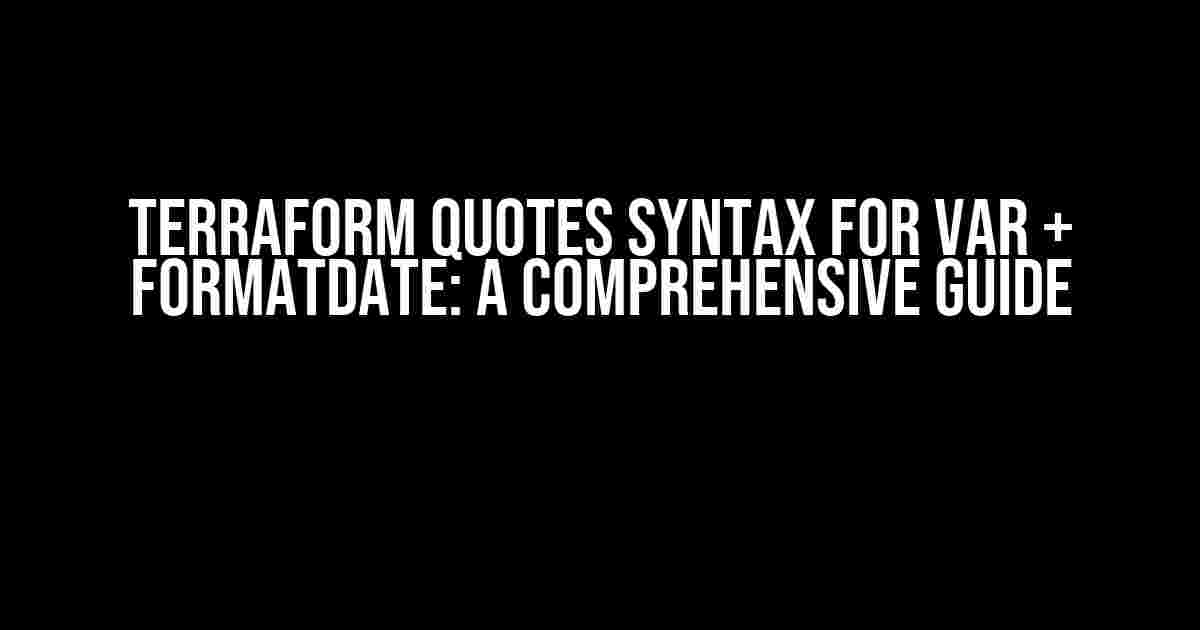When working with Terraform, mastering the quotes syntax for variables and dates is crucial for seamless infrastructure deployment. In this article, we’ll dive into the world of Terraform Quotes Syntax for Var + formatdate, exploring the ins and outs of this powerful combination. Buckle up, as we’re about to embark on a journey of terraforming triumph!
Why Terraform Quotes Syntax Matters
Before we dive into the nitty-gritty of quotes syntax, let’s discuss why it’s essential in Terraform. Quotes are used to enclose string values, which are fundamental in Terraform configurations. Incorrectly formatted quotes can lead to errors, deployment failures, and a whole lot of frustration.
In addition, understanding quotes syntax is vital when working with variables and dates in Terraform. Variables allow you to store and reuse values throughout your configuration, while dates enable you to create dynamic infrastructure deployments based on timestamps. By mastering quotes syntax, you’ll be able to create efficient, scalable, and maintainable infrastructure blueprints.
Terraform Quotes Syntax Basics
Let’s start with the basics. In Terraform, quotes are used to enclose string values. There are two types of quotes in Terraform:
Double quotes (""): Used to enclose strings that contain interpolation expressions.Single quotes (''): Used to enclose strings that don’t contain interpolation expressions.
Here’s an example of using double quotes with an interpolation expression:
variable "my_string" {
type = string
default = "Hello, ${terraform.workspace}!"
}And here’s an example of using single quotes without an interpolation expression:
variable "my_string" {
type = string
default = 'Hello, World!'
()}Terraform Variables and Quotes Syntax
Now that we’ve covered the basics, let’s explore how quotes syntax works with variables in Terraform.
Variable Declaration with Quotes
When declaring variables in Terraform, you can use either double or single quotes. The choice depends on whether you need to use interpolation expressions or not.
variable "my_string" {
type = string
default = "Hello, ${terraform.workspace}!"
}
variable "my_string" {
type = string
default = 'Hello, World!'
}Accessing Variables with Quotes
When accessing variables in Terraform, you can use the ${} syntax or the concat() function. Both methods require proper quotes syntax.
output "my_output" {
value = "${var.my_string} rocks!"
}
output "my_output" {
value = concat(var.my_string, " rocks!")
}Terraform formatdate Function and Quotes
The formatdate() function in Terraform enables you to format dates and timestamps in your infrastructure configurations. When using formatdate(), proper quotes syntax is crucial to avoid errors.
Basic formatdate Function Syntax
The basic syntax of the formatdate() function is as follows:
formatdate("YYYY-MM-DD'T'HH:mm:ss'Z'", timestamp)In this example, the format string is enclosed in double quotes, and the timestamp is passed as an argument.
Using formatdate with Variables and Quotes
When using the formatdate() function with variables, you can combine quotes syntax with variable access.
variable "my_timestamp" {
type = string
default = "2022-01-01T12:00:00Z"
}
output "my_output" {
value = formatdate("YYYY-MM-DD'T'HH:mm:ss'Z'", var.my_timestamp)
}Common Pitfalls and Best Practices
When working with Terraform quotes syntax for variables and dates, it’s essential to avoid common pitfalls and follow best practices.
Avoid Mixing Quotes
Avoid mixing double and single quotes in your Terraform configuration. This can lead to errors and deployment failures.
variable "my_string" {
type = string
default = 'Hello, ${terraform.workspace}!' // WRONG!
}Use Consistent Quotes
Use consistent quotes throughout your Terraform configuration. If you choose to use double quotes, stick to them.
variable "my_string" {
type = string
default = "Hello, ${terraform.workspace}!"
}
variable "my_string" {
type = string
default = "Hello, World!"
}Test and Validate Your Configuration
Always test and validate your Terraform configuration before deploying to production. This will help you catch errors and ensure that your infrastructure is deployed correctly.
Conclusion
In conclusion, mastering Terraform quotes syntax for variables and dates is crucial for efficient and scalable infrastructure deployments. By following the guidelines and best practices outlined in this article, you’ll be well on your way to terraforming triumph!
| Quotes Syntax | Description |
|---|---|
| Double quotes (“”) | Used to enclose strings that contain interpolation expressions. |
| Single quotes (”) | Used to enclose strings that don’t contain interpolation expressions. |
Remember, consistent quotes syntax, proper variable access, and correct use of the formatdate() function are key to successful Terraform deployments. Happy terraforming!
Additional Resources:
Frequently Asked Question
Get ready to master the Terraform quotes syntax for var + formatdate with these frequently asked questions!
What is the correct syntax to interpolate a variable in Terraform using quotes?
The correct syntax is `”${var.my_variable}”`. This will correctly interpolate the value of the `my_variable` variable inside the quotes.
How do I use the `formatdate` function in Terraform to format a date string?
You can use the `formatdate` function in Terraform like this: `”${formatdate(“YYYY-MM-DD”, timestamp())}”`. This will format the current timestamp as a string in the format `YYYY-MM-DD`.
Can I combine a variable and a `formatdate` function inside quotes in Terraform?
Yes, you can! The syntax is `”${var.my_variable}-${formatdate(“YYYY-MM-DD”, timestamp())}”`. This will combine the value of the `my_variable` variable with the formatted date string.
What happens if I forget to use quotes around the `formatdate` function in Terraform?
If you forget to use quotes around the `formatdate` function, Terraform will throw an error! So, always make sure to wrap the `formatdate` function in quotes, like this: `”${formatdate(“YYYY-MM-DD”, timestamp())}”`.
Are there any best practices for using Terraform quotes syntax for var + formatdate?
Yes, always use quotes around variables and `formatdate` functions to ensure correct interpolation. Also, make sure to test your Terraform code thoroughly to catch any syntax errors.
